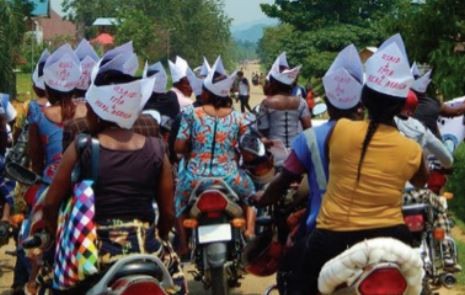- Work With USAID
- How to Work with USAID
- Organizations That Work With USAID
- Find a Funding Opportunity
- Resources for Partners
- Careers
- Get Involved
Speeches Shim

The Ushindi Program implemented a holistic approach integrating psychosocial, medical, legal and economic activities to support survivors of sexual and gender-based violence (SGBV). The project has served a total of 30,467 SGBV survivors, which exceeds the life of the project goal (24,187 persons served). Approximately 90% of survivors served were female, and 68% were 18 years or older. Residents of targeted health zones reported experiencing various types of SGBV, with rape emerging as most common (60%), followed by emotional/psychological violence (14%), physical harassment (11%), sexual harassment (4%), denied resources/opportunities (3%), and unknown/other (7%).
The project has assisted 30,033 people with recovery from SGBV through psychosocial support. Confidential one-on-one counseling by community-based lay counselors is the cornerstone of Ushindi’s psychosocial services. Legal services were made available to 14,112 survivors. This counseling was provided by lawyers in legal clinics set up at safe houses. 16,193 SGBV survivors and their partners were reached with affordable and appropriate medical services, including post-exposure prophylaxis (PEP) kits for HIV/AIDS, prevention and treatment of sexually transmitted infections, emergency contraception, treatment of fistulas, and treatment of vaginal prolapse. Village savings and loans associations (VSLAs) were set up as a socioeconomic initiative aimed at facilitating the reintegration of survivors into the community. The VSLAs focus on funding income-generating activities that support day-to-day social needs such as nutrition, schooling, and health needs. Additionally, 2.2 million community members and school aged children were reached with outreach and public awareness messages to increase awareness and sensitivity to SGBV issues.
The Ushindi model relies heavily on key faith-based, community leaders (e.g., faith counselors) and Noyaux Communautaires (community core groups) to link SGBV survivors to appropriate support services. By design, community leaders and Noyaux Communautaires are the first point of contact for survivors. They are trained to identify survivors, provide psychosocial support, and refer clients to appropriate medical, legal, and socio-economic Community-based campaign to increase awareness of gender-based violence support services. The Noyaux Communautaires play an integral role in educating the community on SGBV prevention and response, women’s rights, and family planning through social and behavior change communication. To date, 108 Noyaux, comprising of 6,350 active members have been instrumental in serving as advocates for social and behavioral change related to gender and SGBV. IMA’s implementation model builds on the existing trust, confidence and established networks of local faith-based organizations to provide a comprehensive package of services. By building relationships between established community leaders and the public health system, the model builds durable and sustainable local capacity among health workers and communities to address the needs of survivors.

Comment
Make a general inquiry or suggest an improvement.